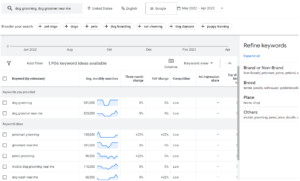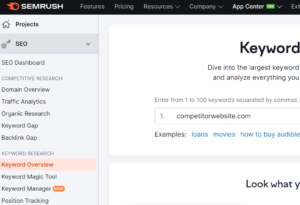When building your search campaigns, it is crucial to have strongly relevant keywords if you want to achieve success. This will create a solid foundation throughout the lifespan of your campaigns. Keywords are the words and phrases that users enter into search engines to find what they are looking for. If your product or service aligns with what someone is searching for, you’ll want them to see your ads. This will help improve your overall quality score, and the higher the quality score, the greater your ROI.
In this blog we’ll look at some important steps needed in building out your list of keywords for your paid search campaigns..
Relevancy Is King
With this task, we will be using the Keyword Planner tool featured in Google Ads. To use this tool, you will need a Google Ads account, but unless you’re running campaigns, you won’t be charged. You will want to start by brainstorming some relevant keywords. This means words and phrases that are highly relevant (high intent) or phrases people would use for your product or service. For example, if you have a dog grooming business, you may want to use the phrase ‘dog grooming near me.’ You can have more narrow and broad ideas to ensure you are capturing as much as possible. Once you have brainstormed a list of terms, you can enter them into Google’s Keyword Planner.
Selecting The Right Phrases
You will see a list of results, including the option to broaden your search. There is also an option on the right to refine your search based on various factors. The planner will provide you with key information such as average monthly search volume and estimated bid range. The competition column will give you an idea of how many advertisers are bidding on that phrase. You will want to sift through this list, selecting the phrases that are relevant and also have a decent amount of search volume. Phrases that are too vague will negatively impact your campaigns. You may want to re-enter some of your selected terms into the planner and gather even more results. Once you feel like you have exhausted your options, you can compile your final list.
Negative Keywords
While researching your new keywords, be vigilant for phrases in which you would not want your ad to be displayed. Make a note of these and add them as negative keywords. This means that if someone searches using those phrases, your ad will not appear. For instance, if your dog grooming business doesn’t cater to certain breeds, you may want to include them as negative keywords. This is another valuable feature within Google Ads that you can utilize to eliminate irrelevant traffic.
Analyze The Competition
You can also use tools like SEMRush or SpyFu to analyze your competition and see what keywords they are bidding on. This can help develop phrase ideas or create competitor campaigns.
Find Themes In Your List
I would recommend copying your list to an Excel file or Google Sheets so that you can analyze it more easily. The objective here is to identify common themes that are shared among multiple keywords. We want to group keywords together in a logical manner so that we can create ad groups based on them. For instance, if you have several keywords related to dog haircuts, you may want to group them together and create an ad group for that category. The aim is to attain the highest possible quality score, and this approach will help you achieve that.
Match Types
Google Ads offers three different match types to choose from when uploading your keywords: Broad Match, where ads may appear for any search term related to your keyword; Phrase Match, where ads may appear for search terms that include the meaning of your keyword; and Exact Match, where ads may appear only when someone types in your exact keyword. Phrase and exact match keywords tend to attract more relevant traffic and offer tighter matching. Broad match can be useful if your goal is to raise awareness.
Maintenance
Once your campaigns are up and running, maintaining and optimizing your keywords is key. You will want to review the performance of your keywords, removing those that are not performing. Regularly review the search terms reporting tool (shows which terms triggered your ads) to add new keywords and find negative keywords. Keeping your campaigns maintained and tightly themed will help your quality score and your success.
Conclusion
Discovering and utilizing the right keywords for your paid search campaign requires research, analysis, and ongoing maintenance. By leveraging the right keywords you can reach your target audience and grow your brand. Applying the tools and mindset discussed above will greatly contribute to achieving optimal results. If you need assistance with your marketing, TribalVision can take on the necessary tasks and help you accomplish your goals.








